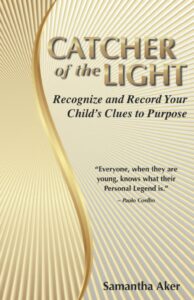Catcher of the Light: Recognize and Record Your Child’s Clues to Purpose by Samantha Aker (Book Excerpt)
 CHAPTER 2
CHAPTER 2
A Reason for Being
Not only must we be good, but we must also be good for something.
Henry David Thoreau
“The two most important days in your life are the day you are born and the day you find out why,” said Mark Twain. For a lucky few, purpose is clear and certain from the very beginning. Some people spend the first half of their lives unfulfilled and then eventually find their way to a sense of purpose through prolonged self-reflection. For others, even after a lifetime of searching, the day they figure out why they were born never comes.
There is no personal vision statement engraved on the back of your birth certificate or tucked inside the scroll of your high school diploma. You can’t put a quarter into a Zoltar machine and get a printout of your destiny. The road to understanding your purpose can be fraught with wrong turns, backtracking, infinite loops, ambiguous signs, and potholes. Even if you have not yet found your own purpose, especially if you haven’t, you will want to do everything in your power to ease and shorten your child’s journey to find hers.
Before you set off to uncover your child’s clues to purpose, it is important to understand what purpose is. Everyone explains it a little differently, but there are commonalities among the interpretations from many cultures. Damon and his colleagues at the Stanford Center on Adolescence define it as “a stable and generalized intention to accomplish something that is at once meaningful to the self and of consequence to the world beyond the self.” The French expression raison d’être means “the justification for one’s existence.” The Japanese word for this notion is ikigai, which roughly translates to “reason for being.” Sociologist Max Weber describes purpose as “a calling reflecting someone’s abilities and how those abilities can serve the world, as well as one’s enjoyment in serving society in their own way.”
In his book The Seven Spiritual Laws of Success, Deepak Chopra, M.D., said, “Everyone has a purpose in life … a unique gift or special talent to give to others. And when we blend this unique talent with service to others, we experience the ecstasy and exultation of our own spirit, which is the ultimate goal of goals (93).” He called this the “Law of Dharma.” Interestingly, the Sanskrit word dharma translates literally to “the right direction,” subtly suggesting that using our gifts to serve others is the path our lives should take.
Most explanations of purpose from all around the world, and all throughout history, concur there are three facets of a purposeful life: doing what you’re good at, doing what you love, and making a difference to others. The clues to your child’s purpose, already alight inside him, are his intrinsic talents and passions, and the needs in the world he is inspired to fill.
Talents—What Your Child Is Good At
Throughout your child’s growth and development you will notice natural aptitudes or virtues. Talents are endeavors your child does extremely well without instruction or learns quickly and effortlessly with very little practice. Early inclinations toward character strengths such as empathy, imagination, and wit are also natural talents.
Passions—What Your Child Loves
Passions and talents are often lumped together but they are quite different. Someone might have a fascination with country music and not be able to sing or play a note, for example. Anything your child loves to do, look at, talk about, read about, play with, listen to, or engage in, regardless of natural ability, is one of her passions.
Opportunities—Needs in the World of Significance to Your Child
Your child’s recognition of a problem or need in his world reveals an opportunity for him to explore how he might make a personally meaningful difference. The issues that capture your child’s attention might be big or small, global or local, profound or seemingly trivial, but any time your child notices a situation that could be better, especially for other people, it is an early indication of a need or issue of personal significance to him.
The meaning of life is to find your gift.
The purpose of life is to give it away.
Pablo Picasso

SAMANTHA AKER is a former high school English teacher, editor, communications manager, and speech writer. She has a Bachelor’s Degree in English with a minor in Business and Technical Writing from the University of Delaware, and is a certified career counselor. Some of her passions include reading, kickboxing, writing, skiing, golfing, and the Philadelphia Phillies. Samantha and her three sons live in Haddonfield, New Jersey, where the snowboard was invented (by a 7th grader following his passions) and where the world’s first complete and intact dinosaur skeleton was found. Visit https://www.amazon.com/Catcher-Light-Recognize-Record-Purpose/dp/B095Q4TD7C.















